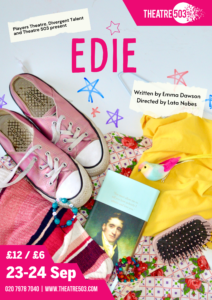
EDIE by Emma Dawson will be staged at Theatre503 on 23rd and 24th September.
An earlier version of the play, titled MUM, was performed as part of the London Playwrights Festival last year so you can imagine our excitement to hear that the play has been developed further and is returning to the stage!
We caught up with writer Emma Dawson and director Lata Nobes to find out more about the play…
Emma, tell us about your inspiration for Edie?
I have dyspraxia, dysgraphia and dyslexia and Edie explores a (probably) neurodivergent 29-year-old, so the play was informed by my life experience.
When I started writing the play, I was fascinated by the theme of family members living with each other into adulthood, particularly where there was an element of somebody wanting to escape from the arrangement, or being horrified that they have to host their relative. I was interested in what living arrangements an audience might find unacceptable and why, alongside exploring the idea that you should tolerate any behaviour from a family member because they are your only family.
I’ve also read a lot of plays and novels about dysfunctional mother and daughter relationships and The Beauty Queen of Leenane by Martin McDonagh was a particular inspiration because it’s such an ugly play with some hysterically funny moments.
For those who don’t know, what is neurodivergence?
Lata: The word Neurodivergent is a relatively recent non-medical umbrella term for a number of different psychological conditions, learning difficulties and disabilities. Some of these include ASD, Dyslexia, Dyspraxia, ADHD, OCD, Tourettes, bipolar… and others. Some of us see themselves as disabled and some do not. The term has been developed as a way of reclaiming our own minds, talking about them in a positive way for our many strengths, uniting us as a group.
When we were living in caves the sensory sensitivity of ASD would be extremely useful, as would the energy of ADHD. All communication and storytelling used to be aural, better suiting dyslexia. Many famous artists have suffered from bipolar (Van Goph, Virginia Woolf, Jimi Hendrix). But our modern, capitalist society rewards traits like productivity, focus and emotional regularity. The term ‘neurotypical’ describes people who largely fit into a brain template that capitalism favours. I increasingly wonder how big this group of people actually is.
We showcased an earlier version of the play in our festival last year, has it changed much since then?
Emma: Edie has gone through multiple rounds of edits since December 2021. Lauretta Barrow, Literary Associate at Theatre503, gave me two amazing sets of notes and Lata and I did further edits based on what came out of the rehearsal room. Lata suggested cutting a few chunks of the script at one point and my immediate reaction was, “Oh, she’s right, that obviously doesn’t need to stay in!” It’s wonderful working with two script editors where you just keep saying, “good point,” because they can see so clearly what you wouldn’t have noticed yourself.
Did the staged reading at the festival influence the redrafting process at all?
Emma: After we saw the play performed with three actors in the reading, Lata and I decided to go ahead with having three actors for the Theatre503 performance. This required re-writing, as the play was a one-woman show, though the changes were actually smaller than I expected because the play is still framed around Edie’s perspective. I’m thrilled about how dynamic this change makes the play, particularly because it involves having Pride & Prejudice-style fantasy dance sequences!
What has the Director/ Writer relationship and process been like?
Lata: One of the things I’ve most enjoyed about that process is that as people with usual brains, me and Emma are able to combine our experiences of confusion, exclusion and our outsider perspective on the world. Edie has become a very rich character as a result, someone I have grown to care for.
At the festival, representing neurodivergent characters and having a neurodivergent creative team was really important. How have these conversations continued throughout the process?
Lata: It has been wonderful building a neurodiverse community around Edie. Through the project I met Adam Welsh, director of Divergent Talent Agency, who is now co-producing alongside associate director Lisa Millar, who is also neurodivergent. Our lighting designer, Megan Lucas, is also part of the neurodivergent club, and so is our casting director, Ryan Carter, making the entire creative team neurodivergent!
Much of my work is inspired by the idea of the social model of disability. The idea is to highlight the ways that society limits people are different by putting up barriers – knowingly or unknowingly. This turns difference (physical or psychological) into disability. It is the outside world that makes it necessary to diagnose neurodivergent conditions: if we lived in a society where everyone was treated as individuals, we wouldn’t need names for collections of symptoms.
Edie has always been referred to as “probably” neurodivergent, because she isn’t diagnosed, and why should we as artists slap a label on her?
I wanted to explore the way that Edie’s life is difficult to navigate because of the neurotypical game – full of unspoken rules, rituals and deception. Edie is a wise character because she can see things for what they are. But all the characters are struggling in a capitalist society: they all have to bend over backwards in order to fit. I hope the piece starts discussions about dull, limiting social norms and how we would like things to be different.
What’s next for the play?
Emma: We hope a longer run in 2023!
You can book to watch EDIE at Theatre503 on September 23rd at 7:30pm or September 24th at 2:30pm here.
Image credit: Henry Roberts

